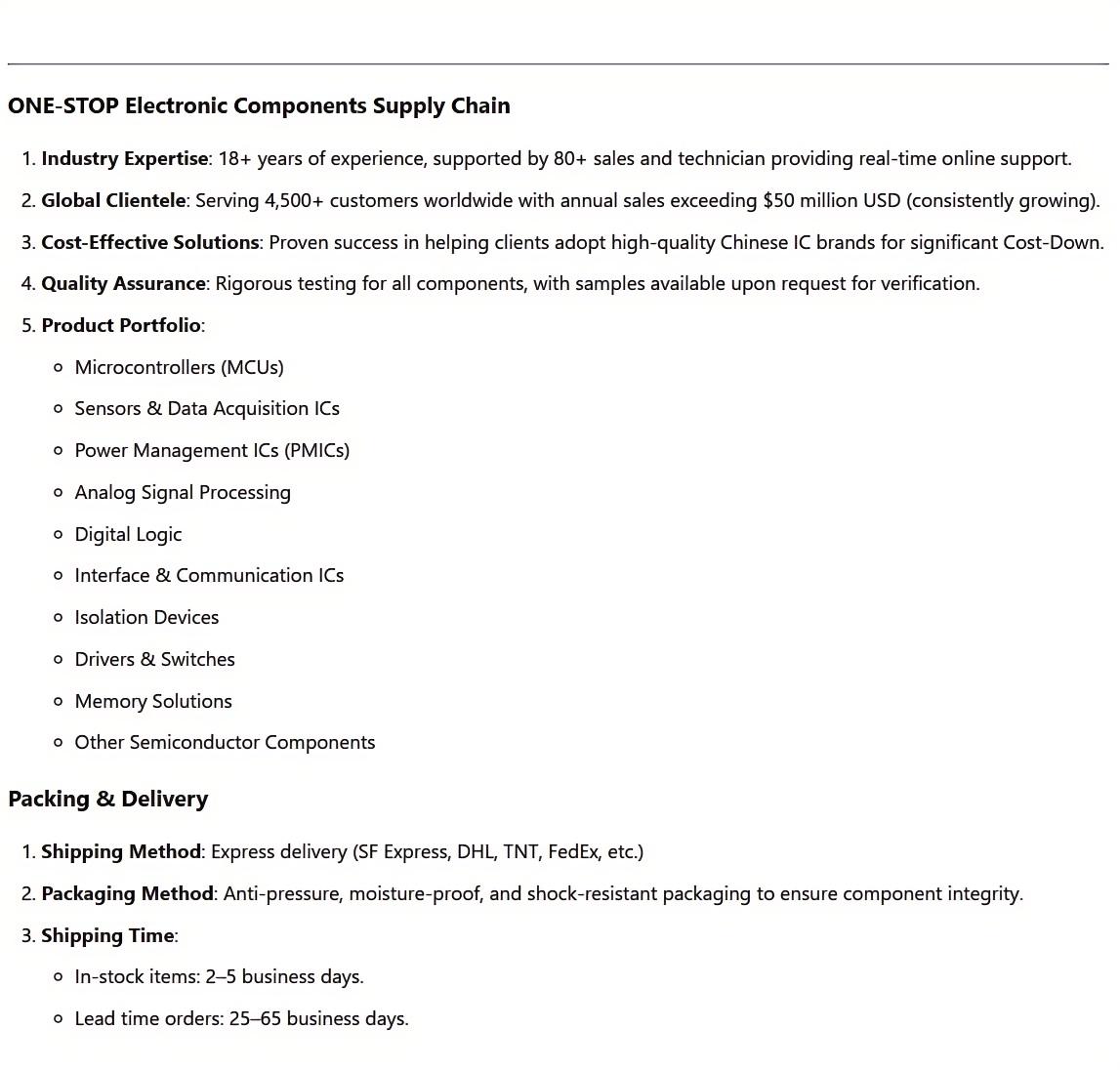RS822XM is a Replacement parts of
AD8646ARMZ-REEL/AD8646ARMZ
/MCP632-E/MF/MCP632T-E/MF
/OPA2322AIDGKR/OPA2322AQDGKRQ1
/OPA2320AIDGKR/OPA2320AIDGKT
Mfr.Part No. :
RS822XMManufacturer :
RUNICDescription :
14MHz, Rail-to-Rail I/O CMOS Operational AmplifierPackaging :
ReelPackage :
SOT23-5(-6)/SOIC8/MSOP10/SOIC14Stock :
in stockPrice :
$0.22-$0.32
RS822XM
| Price: | $0.22-$0.32 | $0.35-$0.5 | $0.38-$0.65 | $0.95-$1.1 |
|
Replace parts:
Replacement parts:
Alternative parts:
Pin to pin parts:
|
RS822XM |
MCP632-E/MF
MCP632T-E/MF
|
OPA2322AIDGKR
OPA2322AQDGKRQ1
OPA2320AIDGKR
OPA2320AIDGKT
|
AD8646ARMZ-REEL
AD8646ARMZ
|
The RS822XM is a high-performance operational amplifier (op-amp) from RUNIC designed for precision signal conditioning and amplification in a variety of industrial, automotive, and consumer applications. In this comparison, we analyze the RS822XM against several competing products, including the AD8646ARMZ, MCP632, OPA2322AIDGKR, and OPA2320AIDGKR from Analog Devices, Microchip, and Texas Instruments, respectively, with a focus on highlighting the RS822XM's advantages in terms of accuracy, low power consumption, bandwidth, and overall reliability.
The AD8646ARMZ from Analog Devices is a precision op-amp with a low offset voltage, designed for high-precision analog signal applications. While the AD8646ARMZ offers a low offset voltage (as low as 25 μV) and low bias current, the RS822XM provides a significant edge with even lower offset voltage (as low as 15 μV) and superior drift performance over a wide temperature range. This makes the RS822XM more suitable for precision applications where long-term stability is critical.
In terms of power consumption, the RS822XM operates at lower supply currents than the AD8646ARMZ, making it more energy-efficient and better suited for battery-powered and low-power systems. Additionally, the RS822XM features a wider supply voltage range, offering increased flexibility in diverse operational environments, whereas the AD8646ARMZ is more limited in terms of its supply voltage flexibility.
The MCP632 series from Microchip is another competitor, offering low-power operation and precision. While the MCP632 does have a low offset voltage (typically 25 μV) and low quiescent current (around 1.0 μA), the RS822XM outperforms it with its lower offset voltage (15 μV) and superior PSRR (Power Supply Rejection Ratio). The RS822XM also offers better bandwidth at 3 MHz compared to the MCP632's bandwidth of 1 MHz, making the RS822XM better suited for high-speed precision applications that require quick response times.
Furthermore, the RS822XM provides better temperature stability and lower drift, ensuring that it maintains consistent performance even in high-temperature environments, which is essential for many industrial and automotive applications. The MCP632, while still a strong choice for low-power applications, lacks the same level of precision and stability at extreme temperatures.
The OPA2322AIDGKR and OPA2322AQDGKRQ1 from Texas Instruments are precision, low-power op-amps designed for use in sensor interfacing and portable equipment. While these products offer a low input offset voltage (as low as 25 μV) and low input bias current, the RS822XM provides a better power-supply rejection ratio (PSRR), making it less sensitive to power supply noise and fluctuations. This is especially advantageous in sensitive measurement applications where clean, stable signals are critical.
Additionally, the RS822XM offers a higher bandwidth (3 MHz) compared to the OPA2322's 2 MHz bandwidth. This makes the RS822XM more suitable for high-speed signal processing tasks while still maintaining low distortion and high precision. The OPA2322, on the other hand, may exhibit higher signal degradation at higher frequencies.
The OPA2320AIDGKR and OPA2320AIDGKT from Texas Instruments are similar to the OPA2322 family in terms of low-power performance and low offset voltage. However, the RS822XM outperforms the OPA2320 devices in several key areas. The RS822XM has a lower input bias current, offering improved accuracy and signal integrity in low-current applications. It also offers better temperature stability, ensuring consistent performance even in extreme conditions.
While the OPA2320 series offers low supply current and low offset voltage, the RS822XM also provides a better supply voltage range, which is beneficial for flexibility in a variety of system configurations. The RS822XM is designed to meet the requirements of high-precision applications, including sensor interfaces, instrumentation, and medical devices, where long-term performance and reliability are paramount.
Lower Offset Voltage: The RS822XM features an offset voltage as low as 15 μV, providing better accuracy and lower error in sensitive applications compared to its competitors.
Better Temperature Stability: The RS822XM exhibits minimal drift even at extreme temperatures, ensuring consistent performance across a wide temperature range.
Superior Power Supply Rejection Ratio (PSRR): The RS822XM offers a better PSRR, ensuring less susceptibility to power supply noise, which is critical for high-precision applications.
Wider Supply Voltage Range: The RS822XM offers a wider supply voltage range, giving it more flexibility for use in a variety of system designs.
Higher Bandwidth: With a bandwidth of 3 MHz, the RS822XM provides faster response times and better high-speed performance than many of its competitors.
The RS822XM stands out as a high-precision, low-power operational amplifier that excels in terms of offset voltage, power supply rejection, bandwidth, and temperature stability. While products like the AD8646ARMZ, MCP632, OPA2322, and OPA2320 offer strong performance in specific areas, the RS822XM provides a more comprehensive solution for demanding applications that require high accuracy, low distortion, and long-term reliability. Whether used in sensor interfacing, data acquisition, or high-precision industrial systems, the RS822XM is the ideal choice for customers seeking outstanding performance and flexibility in their operational amplifier solutions.

Hot Tags :